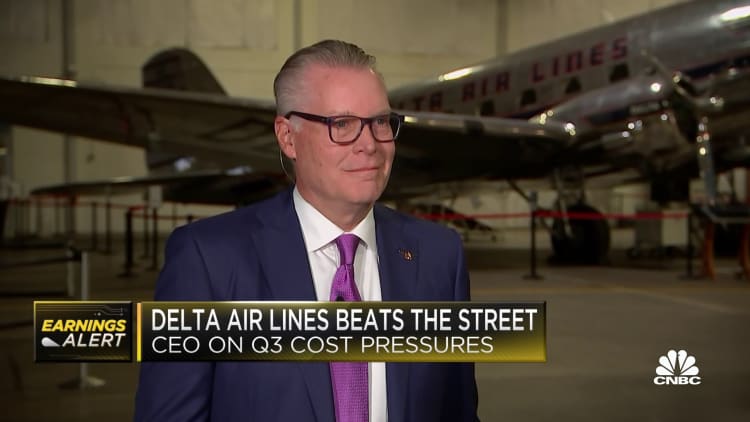

Delta Air Lines’ profit rose nearly 60% in the third quarter as strong travel demand continued through the summer, particularly for international trips, though the carrier forecast full-year earnings toward the low end of an earlier estimate after a jump in fuel prices.
In its quarterly report Thursday, Delta said it expects adjusted, full-year earnings of $6 to $6.25 a share, after forecasting $6 to $7 a share in July. Delta cut its free cash flow estimate for the year to $2 billion from the $3 billion it forecast in the summer.
Delta said that it expects solid travel demand in the last three months of the year, estimating revenue will rise 9% to 12% from the same quarter of 2022, with per-share earnings of $1.05 to $1.30, in line with estimates.
“We expect many of the same trends to continue in the fourth quarter,” CEO Ed Bastian said in a CNBC interview.
An Airbus A330-323 aircraft, operated by Delta Air Lines.
Benoit Tessier | Reuters
Delta and other airlines trimmed their third-quarter forecasts in recent weeks because of a surge in fuel prices.
“Obviously there’s some short-term pressure on fuel as fuel rose quickly in the third quarter and stayed relatively high into the fourth quarter,” Bastian noted.
Here’s how Delta performed in the three months ended Sept. 30 compared with Wall Street expectations based on consensus estimates from LSEG, formerly known as Refinitiv:
- Adjusted earnings per share: $2.03 cents vs. $1.95 expected.
- Adjusted revenue: $14.55 billion vs. $14.56 billion expected.
Delta brought in adjusted revenue of nearly $14.6 billion for the period, up 13% year over year and in line with analysts’ expectations.
Net income for the period was $1.11 billion, or $1.72 per share, up 59% from $695 million, or $1.08 per share, during the same period a year earlier. Adjusted for third-party refinery sales and other items, the company earned $2.03 during the quarter.
Delta and other global airlines have cited particularly strong demand for trips abroad, with trans-Atlantic travel a standout. The Atlanta-based carrier reported revenue for those flights was up 34% in the third quarter compared with last year.
Delta’s planes flew 88% full in the quarter, up 1 percentage point from the year-earlier period, despite additional capacity both domestically and internationally. Unit revenue from passengers fell 1.5%, year over year. Airfares have dropped in recent months as airlines grew their schedules.
In addition to a surge in international trips, the carrier has said it has seen a sharp increase in demand for premium seats, like business class or premium economy. Main cabin revenue came in at $6.62 billion, up 12% on the year, while premium product sales rose 17% to $5.11 billion, Delta said.
“I know the lower-fare airlines are having some challenges but our premium product, especially domestically is doing very, very well,” Bastian said in the interview. He added that business travel is more than 80% recovered to 2019 levels.
However, Delta President Glen Hauenstein said Thursday on an earnings call that the Hollywood and autoworkers strikes have hurt demand from those sectors.
Delta has a more than 70% market share in Detroit and nearly 20% at Los Angeles International Airport, the most of any carrier.
Delta came under fire from customers last month when it announced it would make it harder to earn elite frequent flyer status and said it will scale back access to its popular airport lounges after travelers experienced long entry lines. Weeks later, Bastian said the carrier would make changes to those new policies, which he said might have gone “too far.”
Bastian declined to provide details but said changes could be announced in the “coming days.”
“Customers almost universally understand we had to do something given the significant demand for our premium assets,” he said.
United Airlines and American Airlines are scheduled to report third-quarter results next week.